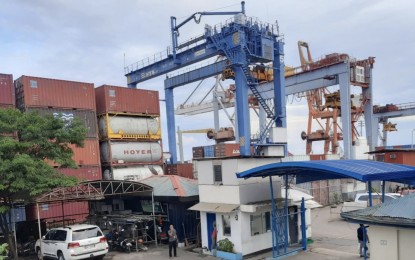
FINE PER CLERICAL ERROR. To fight technical smuggling and maximize revenue collection, the Bureau of Customs-Port of Cebu is strictly imposing the PHP5,000 fine for every clerical error committed by an importer in the import entry and other customs documents. BOC-Cebu acting district collector lawyer Charlito Martin Mendoza on Monday (July 6, 2020) said imposition of fines is allowed by a customs memorandum order in order to fight misdeclaration and misclassification, the usual technical smuggling committed by importers. (PNA photo by John Rey Saavedra)
CEBU CITY – The Bureau of Customs–Port of Cebu is imposing PHP5,000 fine per clerical error in the import entry and other customs documents as part of the campaign to eliminate technical smuggling and collect alternative sources of revenue.
Lawyer Charlito Martin Mendoza, BOC-Cebu acting district collector, said imposing fines may help them cope with the decline in the volume of importation which affected their collection effort in time with the slower economy because of coronavirus disease 2019 (Covid-19) pandemic.
But most of all, Mendoza said they impose the fine for every erroneous entry to avoid misdeclaration and misclassification of goods being imported.
He said there has been a customs memorandum order imposing PHP5,000 fine for every erroneous entry especially on the value and classification of the goods subject of importation, but they aggressively implement it now “to see to it that proper customs duties and taxes are paid accordingly” in the light of the slower importation activities.
“We impose a fine if the shipment is not seizurable based on the magnitude of discrepancy. The fine is on top of the difference in tax and penalty. But if the discrepancy is as high as 30 percent of the actual value of the goods, the whole shipment should be seized,” Mendoza told the Philippine News Agency on Monday.
He said his office has so far been able to send 60 demand letters.
As of Friday last week, BOC-Cebu was able to collect fines equivalent to eight clerical errors committed by different importers.
“We hope after some time that we will be imposing fines on their clerical errors, they will become diligent in filling up the customs goods declaration document,” he added.
Aside from fine imposition, Mendoza said customs examiners are doubling their vigilance on fake and recycled supporting documents which became a source of fraud in filing their import entries.
He said the National Value Verification System (NVVS) is helping the Port of Cebu in determining the correct value of goods in case importers could not substantiate the value they declared over the goods.
The NVVS serves as a reference for value verification based on previous similar or identical goods.
Mendoza said it can only become a basis if the importer cannot substantiate transaction value through “credible documents”.
The Cebu customs will also auction off aluminum tubes and feed-grade rice in order to raise some PHP50 million non-traditional revenue.
He also said Republic Act 10963, the Tax Reform for Acceleration and Inclusion Act or Republic, is also helping the collection efforts of the BOC-Cebu because of the higher excise taxes on importation.
Also, Republic Act 11203 or the Rice Tariffication Law that lifts the quantitative restriction on rice imports and replaces it with a general tariff, has opened more liberalized purchase of rice from abroad and enables them to collect more duties and taxes.
Although there is a decline in the volume of imports, BOC-Cebu was able to collect PHP455.7 million surplus from the PHP2.088-billion target for June after being able to collect PHP2.54 billion.
“The biggest impact is the decline of volume of importations which translates to reduced collection. That is why, we try to maximize whatever amount that we can collect from the reduced importations that are coming in now,” he added. (PNA)
